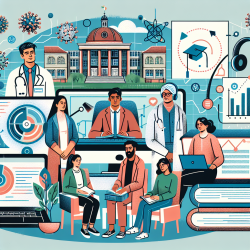In the wake of the COVID-19 pandemic, the role of remote treatment, including psychotherapy, has gained prominence. A recent study titled "Online group psychodynamic psychotherapy—The effectiveness and role of attachment—The results of a short study" provides valuable insights into the effectiveness of online group psychodynamic psychotherapy, especially in relation to attachment styles. This blog aims to distill the key findings of the study and offer practical tips for practitioners to enhance their therapeutic approaches.
Key Findings
The study involved 22 outpatients who participated in a 10-week online synchronous group psychodynamic psychotherapy via Zoom. The researchers aimed to test four main hypotheses:
- Patients will obtain a lower score in the attachment’s dimensions of anxiety and avoidance.
- Patients will get a lower level of symptoms and sense of loneliness.
- Patients will have increased self-esteem.
- The anxiety and avoidance dimensions of attachment will be predictors for the effectiveness of online psychodynamic group psychotherapy.
The results were promising:
- There was a reduction in the global severity of psychiatric symptoms and depressive symptoms.
- Patients experienced an increase in self-esteem and a reduction in feelings of loneliness.
- A significant change was observed in the attachment dimensions of anxiety and avoidance.
Practical Tips for Practitioners
Based on the study's outcomes, here are some practical tips for practitioners to improve their skills and therapeutic approaches:
1. Focus on Attachment Styles
Understanding and addressing patients' attachment styles can significantly impact the effectiveness of therapy. Practitioners should assess attachment dimensions of anxiety and avoidance before and during therapy to tailor interventions accordingly.
2. Leverage Group Dynamics
Group cohesion and interpersonal relationships play a crucial role in the effectiveness of psychodynamic group therapy. Encourage spontaneous interactions among group members and focus on building a supportive group environment.
3. Monitor and Evaluate Symptoms
Regularly monitor the severity of psychiatric symptoms, depressive symptoms, and self-esteem levels. Use standardized tools to evaluate changes and adjust therapeutic strategies as needed.
4. Address Loneliness
While online therapy can reduce psychiatric symptoms, it may not always alleviate feelings of loneliness. Incorporate strategies to foster social connections and support within the group to mitigate loneliness.
5. Continuous Professional Development
Stay updated with the latest research and best practices in online group psychotherapy. Attend conferences, webinars, and workshops to enhance your skills and knowledge.
Conclusion
The study underscores the potential of online group psychodynamic psychotherapy in reducing psychiatric symptoms and improving self-esteem. However, it also highlights the need for further research to fully understand the impact of attachment styles and the challenges related to loneliness. Practitioners are encouraged to incorporate these findings into their practice to enhance therapeutic outcomes.
To read the original research paper, please follow this link: Online group psychodynamic psychotherapy—The effectiveness and role of attachment—The results of a short study.










